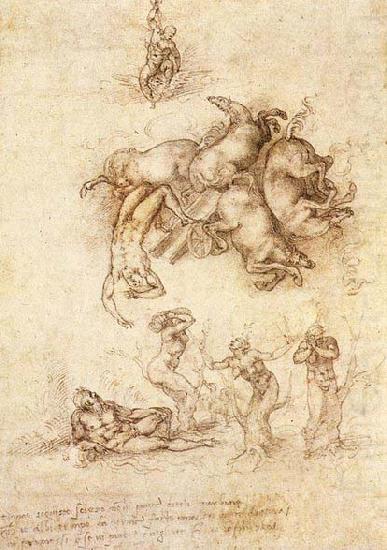All
Michelangelo Buonarroti Oil Paintings
Painting:: The Fall of Phaeton
1533 Chalk British Museum, London In Greek mythology Phaeton was the son of Helios, the sun-god. Helios drove his golden chariot, a 'quadriga' yoked to a team of four horses abreast, daily across the sky. Phaeton persuaded his unwilling father to allow him for one day to drive his chariot across the skies. Because he had no skill he was soon in trouble, and the climax came when he met the fearful Scorpion of the zodiac. He dropped the reins, the horses bolted and caused the earth itself to catch fire. In the nick of time Jupiter, father of the goods, put a stop to his escapade with a thunderbolt which wrecked the chariot and sent Phaeton hurtling down in flames into the River Eridanus (according to some, the Po). He was buried by nymphs. Phaetons's reckless attempt to drive his father's chariot made him the symbol of all who aspire to that which lies beyond their capabilities. The fall of Phaeton was a popular theme, common in Renaissance and Baroque painting, especially on ceilings in the later period. Phaeton, the chariot, and four horses, reins flying, all tumble headlong out of the sky. Above, Jupiter throws a thunderbolt. Artist: MICHELANGELO Buonarroti Title: The Fall of Phaeton Date: 1501-1550 Italian , graphics : religious
Painting ID:: 62908
Height
Width
INS/CM
Quality
Wholesale China Mirror Directly From China Factory
|
||||||||||||||||||||||||||||||||||||||||||||||||||||||||||





